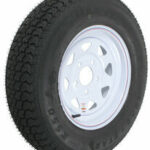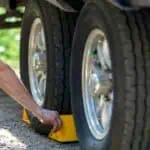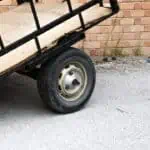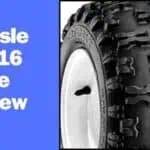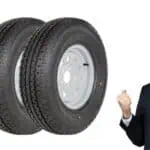Why are Trailer Tires Junk? Trailer tires are often made of lower quality materials than regular passenger or light truck tires. They also typically have a shorter lifespan and are not designed to be driven on paved roads for long periods of time. This makes them ideal for use on trailers, which are typically only used for short periods of time and then stored until they are needed again.
However, it also means that trailer tires are more likely to fail than other types of tires.
Trailer tires are often made with a lower quality of rubber than regular passenger car tires. This is because they are not subject to the same safety and performance standards as passenger car tires. Additionally, trailer tires are often used for long periods of time without being replaced, which can cause them to degrade faster.
Why Do Trailer Tires Wear Out So Fast?
One of the most common questions we get here at The Tire Rack is “Why do my trailer tires wear out so fast?”
While there are a number of reasons that could contribute to premature tire wear on a trailer, one of the most common causes is improper inflation.
Trailer tires are designed to carry a significantly heavier load than passenger or light truck tires, so they need to be inflated to a higher pressure in order to support that weight.
If trailer tires are not properly inflated, the extra weight can cause them to flex and bow more than they’re designed to, which leads to increased heat build-up and eventually tread separation.
Another common cause of premature tire wear on trailers is incorrect wheel alignment. Just like on a car, if the wheels on your trailer are not aligned correctly it can cause the tires to scrub against the pavement as you’re driving down the road.
This scrubbing action creates excessive heat build-up in the tires which can lead to tread separation.
If you’re noticing that your trailer tires seem to be wearing out faster than they should, take a close look at your inflation pressures and wheel alignment. Making sure both are where they need to be will help prolong the life of your tires and keep you safely on the road.
What is the Average Life of a Trailer Tire?
The average life of a trailer tire is typically between four and six years. However, this can vary depending on how often the trailer is used, as well as the conditions it is typically driven in. For example, if a trailer is only used occasionally and mostly on paved roads, its tires may last much longer than if it was used frequently on off-road terrain.
Similarly, if a trailer is stored in an area where temperatures regularly exceed 100 degrees Fahrenheit, the lifespan of its tires will likely be shorter than if it was stored in a cooler location. Ultimately, it is important to check your trailer’s tires periodically for signs of wear and tear, regardless of how old they are or how often the trailer is used.
Is It Ok to Use Car Tires on a Trailer?
If you have a trailer, you may be wondering if it’s okay to use car tires on it. The answer is yes, car tires can be used on a trailer as long as they are the correct size and load rating for the trailer. Keep in mind that car tires are not designed for towing and will wear out faster when used in this way.
It’s also important to make sure the tires are inflated to the proper pressure for both safety and to prevent premature wear.
Are Car Tires Better Than Trailer Tires?
There are a few key differences between car tires and trailer tires that make one better than the other in certain situations. Car tires are designed for braking and cornering, while trailer tires are made for stability and towing heavy loads. Trailer tires also have a higher load rating than car tires, so they can handle more weight without sacrificing safety or performance.
If you’re looking for the best tire for your car or trailer, it really depends on what you’ll be using it for most often. If you frequently tow heavy loads or drive on rough roads, then a trailer tire is probably a better choice. However, if you mostly stick to paved roads and don’t do much towing, then a car tire will likely suffice.
Tires Wearing on Inside on Trailer
If you notice that your trailer tires are wearing on the inside, there are a few possible causes. First, check your tire pressure. If the pressure is too low, it can cause the tires to wear unevenly.
Second, make sure your axle is properly aligned. If it’s not, it can cause the tires to wear on one side more than the other. Finally, check the suspension.
If it’s not working correctly, it can also cause uneven tire wear.
Trailer Tires Wearing on the Outside
If you notice your trailer tires wearing on the outside, it’s important to take action. This type of wear can lead to a blowout, which can be extremely dangerous.
There are several possible causes of this type of tire wear.
It could be due to overloading, incorrect inflation, or even just improper alignment. Whatever the cause, it’s important to get it fixed as soon as possible.
If you’re not sure what’s causing the problem, take your rig to a qualified technician for an inspection.
They’ll be able to diagnose the issue and recommend the best course of action. In some cases, they may even be able to fix the problem right then and there.
In other cases, you may need to purchase new tires.
When doing so, make sure to get ones that are rated for the weight of your trailer. Also, pay attention to the tread depth and load range when making your selection.
With proper care and maintenance, you can avoid this type of tire wear and keep yourself safe on the road.
Why are Trailer Tires So Small
If you’ve ever wondered why trailer tires are so small, you’re not alone. It’s a common question, and there are a few different reasons for it.
First of all, trailers are typically much lighter than the vehicles they’re carrying.
This means that they don’t need as much tire to support their weight. Additionally, trailer tires are often inflated to a higher pressure than vehicle tires, which helps them last longer and resist wear and tear.
Another reason trailer tires are small is because they have to be able to fit inside the wheel well of the vehicle they’re being towed behind.
If they were any larger, they wouldn’t be able to make the turn into the wheel well when making a turn with the vehicle.
Finally, small tires help improve fuel efficiency by reducing drag on the trailer. This is especially important for long-haul truckers who are trying to save money on diesel fuel.
So there you have it! Three good reasons why trailer tires are smaller than what you might expect. Next time you see a set of tiny trailer tires, now you’ll know why they’re that way.
How to Make Trailer Tires Last Longer
Are you towing a trailer and want to make sure your tires last? Here are some tips on how to make trailer tires last longer.
It is important to check your tire pressure regularly- at least once a month.
Tires can lose air for many reasons, such as temperature changes or even just driving on the highway. Keeping an eye on the pressure will help prevent flats and blowouts, both of which can be dangerous when you’re towing a trailer.
In addition to checking the pressure, you should also inspect the tread and sidewalls of your tires for any cracks, cuts, or other damage.
If you see any damage at all, it’s time for new tires.
When loading up your trailer, be sure not to overload it. This puts unnecessary strain on the tires and will shorten their lifespan.
Follow the weight limit guidelines for your particular model of tire.
Finally, try to avoid sharp turns when possible. Sudden movements put extra stress on the sidewalls of the tire which can cause them to fail suddenly.
If you follow these tips, you’ll be well on your way to extending the life of your trailer tires!
Trailer Tire Load
Assuming you would like a blog post discussing the proper load for trailer tires: Most people don’t realize how important it is to maintain the correct tire pressure on their trailer. Not only is it important for safety reasons, but it can also save you money in the long run.
Under-inflated tires are more prone to failure and they also create more heat which can lead to premature tread wear. Over-inflated tires will ride harder and put unnecessary stress on your suspension components. The best way to know what pressure to keep your trailer tires at is to consult the owner’s manual or the tire placard that is required by law to be affixed to every new vehicle.
This placard will list the recommended tire pressure for both loaded and unloaded conditions. It’s always best practice to check your trailer tire pressures when the trailer is cold (before being driven) because as tires warm up from driving, they will increase in pressure about 1-2 PSI above their cold inflation rating. So, if your placard says 65 PSI max cold inflation, you should check them when you first start out and then again after a few miles of driving just to be safe.
Trailer Tires on Truck
If you’re like most people, you probably don’t think much about the tires on your truck. But if you’re hauling a trailer, those tires are vitally important. Here’s what you need to know about choosing the right tires for your trailer:
The first thing to consider is the weight of your trailer. Heavier trailers require heavier-duty tires. The second thing to consider is the type of terrain you’ll be traveling on.
If you’re going off-road, you’ll need a tire that can handle rough terrain. Finally, consider the climate in which you’ll be driving. Hotter climates require tires that can withstand higher temperatures.
When it comes to choosing trailer tires, there are a few different brands that are trusted by truckers: Goodyear, Michelin, and Carlisle. All three of these brands make quality products that will get the job done right.
So now that you know a little bit more about choosing the right tires for your trailer, hit the road with confidence knowing that your wheels are up to the task!
How to Choose Trailer Tires?
Trailer tires are an important part of towing a trailer. They must be able to grip the road and provide good traction, while also being able to handle the weight of the trailer. There are many different kinds of trailer tires on the market, so how do you choose the right ones for your needs?
Here are some things to consider when choosing trailer tires:
1. The first thing you need to know is what size tire you need. This information can be found in your owner’s manual or on the placard that is required by law to be affixed to trailers in most states.
The size will be listed as a series of numbers and letters, such as ST205/75R15. The width is measured in millimeters (205), while the height is a percentage of the width (75), and finally the “R” denotes that it is a radial tire.
2. Once you know what size tire you need, you can narrow down your choices by looking at load range and speed rating.
The load range indicates how much weight each tire can support safely. For example, a light truck tire may have a load range of C, which means it can support up 2200 pounds per tire safely. Speed rating tells you how fast each tire can go without failing under normal conditions; for instance, an S-rated tire can go up 85 mph without problems.
3.”All-season” vs “summer” or “winter” tires – All-season tires are designed to provide good traction in both warm and cold weather conditions; however, they may not perform as well as summer or winter tires in extreme conditions (very hot or very cold temperatures). Summer or winter tires are designed specifically for those conditions; therefore, they may provide better traction than all-season tires when used during those seasons.
Conclusion
Trailer tires are often made with lower quality materials than regular passenger vehicle tires. They also typically have a shorter lifespan and are not designed for the same type of driving conditions. As a result, trailer tires are generally considered to be inferior to regular passenger vehicle tires.



